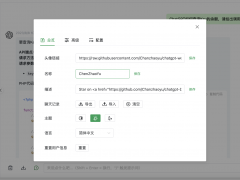描述
显示你的博客信息,大部分都是显示WordPress管理界面的 用户资料 和 常规设置 中的信息。它可以在模板文件的任何地方使用。一般 bloginfo() 都是用来直接在浏览器中输出内容的。如果你需要在PHP中返回值的话,那么请用 get_bloginfo()。
用法
<?php bloginfo( $show ); ?>
参数
$show (字符串string) (可选)你需要输出的信息的关键词。
默认: name
- ‘name‘ – 显示在 设置 > 常规 中设置的“站点标题”。 该数据是从 wp_options 这个数据表中检索到的 “blogname”记录。
- ‘description‘ – 显示在 设置 > 常规 中设置的“副标题”。该数据是从 wp_options 这个数据表中检索到的 “blogdescription” 记录。
- ‘wpurl‘ – 显示在 设置 > 常规 中设置的 “WordPress 地址 (URL)”。该数据是从 wp_options 这个数据表中检索到的 “siteurl” 记录。 可以考虑使用 site_url() 来代替,尤其是在使用 子目录路径方式,而不是使用 子域名 来配置多站点时(bloginfo将返回根网站的URL,而不是子站点的URL)。
- ‘siteurl‘ / ‘url‘ – 显示在 设置 > 常规 中设置的 “站点地址(URL)”)”。该数据是从 wp_options 这个数据表中检索到的 “home”记录。 可以考虑使用 home_url() 代替。
- ‘admin_email’ – 显示在 设置 > 常规 中设置的 “电子邮件地址”。该数据是从 wp_options 这个数据表中检索到的 “admin_email”记录。
- ‘charset’ – 显示在 设置 > 常规 中设置的“页面和feed的编码”。该数据是从 wp_options 这个数据表中检索到的”blog_charset” 记录。(注:3.5.1+好像已经没有这个选项了)
- ‘version’ – 显示你当前使用的 WordPress 版本。该数据是在 wp-includes/version.php 检索到的 $wp_version 这个字段的值。
- ‘html_type’ – 显示WordPress HTML 页面中的内容类型(默认: “text/html”)。该数据可以从 wp_options 这个数据表中检索到的 “html_type” 记录。主题和插件可以通过使用 pre_option_html_type 过滤器覆盖默认值。
- ‘text_direction’ – 显示 WordPress HTML 页面的文本方向。可以考虑使用 is_rtl() 代替。
- ‘language’ – 显示WordPress的语言。
- ‘stylesheet_url’ – 显示当前使用的主题的 CSS文件(通常为 style.css)路径。可以考虑使用 get_stylesheet_uri() 代替。
- ‘stylesheet_directory’ – 显示当前使用的主题的样式表路径。可以考虑使用 get_stylesheet_directory_uri() 代替。
- ‘template_url’ / ‘template_directory’ – 当前主题的 URL 路径 。在子主题中, get_bloginfo(‘template_url’) 和 get_template() 都将返回父主题的目录。可以考虑使用 get_template_directory_uri() (用于父主题目录)或get_stylesheet_directory_uri() (用于子主题目录)代替。
- ‘pingback_url’ – 显示通告文件 XML-RPC 的URL (xmlrpc.php)
- ‘atom_url’ – 显示 Atom feed URL (/feed/atom)
- ‘rdf_url’ – 显示 RDF/RSS 1.0 feed URL (/feed/rfd).
- ‘rss_url’ – 显示 RSS 0.92 feed URL (/feed/rss).
- ‘rss2_url’ – 显示 RSS 2.0 feed URL (/feed).
- ‘comments_atom_url’ – 显示评论的 Atom feed URL (/comments/feed).
- ‘comments_rss2_url’ – 显示评论的 RSS 2.0 feed URL (/comments/feed).
例子
显示博客标题
在 <h1> 标签中显示博客标题
<h1><?php bloginfo(‘name’); ?></h1>
显示带链接的博客标题
显示一个带站点链接的博客标题
<a href=”<?php bloginfo(‘url’); ?>” title=”<?php bloginfo(‘name’); ?>”><?php bloginfo(‘name’); ?></a>
显示字符集
显示你博客设置的字符集(例如“UTF-8”)
<p>Character set: <?php bloginfo(‘charset’); ?> </p>
显示博客描述
显示在 设置 > 常规 中设置的“副标题”
<p><?php bloginfo(‘description’); ?> </p>
示例输出
从 2.7 版开始,在主机中,站点地址(URL) 显示的是 http://www.example.com/home, WordPress 地址 (URL) 是安装在 http://www.example.com/home/wp。
需要注意的是,这些链接是不带最后的斜线的!
admin_email = admin@example.com
atom_url = http://www.example.com/home/feed/atom
charset = UTF-8
comments_atom_url = http://www.example.com/home/comments/feed/atom
comments_rss2_url = http://www.example.com/home/comments/feed
description = Just another WordPress blog
home = http://www.example.com/home (已弃用!使用 url 替代)
html_type = text/html
language = en-US
name = Testpilot
pingback_url = http://www.example.com/home/wp/xmlrpc.php
rdf_url = http://www.example.com/home/feed/rdf
rss2_url = http://www.example.com/home/feed
rss_url = http://www.example.com/home/feed/rss
siteurl = http://www.example.com/home (已弃用!使用 url 替代)
stylesheet_directory = http://www.example.com/home/wp/wp-content/themes/largo
stylesheet_url = http://www.example.com/home/wp/wp-content/themes/largo/style.css
template_directory = http://www.example.com/home/wp/wp-content/themes/largo
template_url = http://www.example.com/home/wp/wp-content/themes/largo
text_direction = ltr
url = http://www.example.com/home
version = 3.5
wpurl = http://www.example.com/home/wp
所在文件
bloginfo() 包含在 wp-includes/general-template.php。
相关函数
get_bloginfo()
目录URL标签
WordPress的目录:
- home_url() 首页URL http://www.example.com
- site_url() 网站目录URL http://www.example.com 或 http://www.example.com/wordpress
- admin_url() 管理目录URL http://www.example.com/wp-admin
- includes_url() 包含目录URL http://www.example.com/wp-includes
- content_url() 文章目录URL http://www.example.com/wp-content
- plugins_url() 插件目录URL http://www.example.com/wp-content/plugins
- theme_url() 主题目录URL http://www.example.com/wp-content/themes
- wp_upload_dir() 上传目录URL (返回一个数组) http://www.example.com/wp-content/uploads



















![[开源推荐] yii2-cdn 支持七牛、网易云、腾讯云、阿里云的cdn](https://www.viphper.com/wp-content/uploads/2022/12/4c53b2a47e5cd5f-240x180.jpeg)